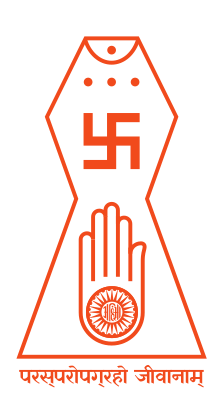Naminatha
Naminatha was the twenty-first tirthankara of the present half time cycle, Avsarpini. He was born to the King Vijaya and Queen Vipra of the Ikshvaku dynasty. King Vijaya was the ruler of Mithila at that time.[3] When Naminatha was in his mother's womb, Mihila was attacked by a group of powerful kings. The aura of Naminatha forced all the kings to surrender to King Vijaya.[4]
| Naminatha | |
|---|---|
21st Tirthankara | |
Naminatha statue at Mathura Museum | |
| Venerated in | Jainism |
| Predecessor | Munisuvrata |
| Successor | Neminatha |
| Symbol | Blue Water-Lily Or Blue Lotus[1] |
| Height | 15 bows (45 metres)[2] |
| Color | Golden |
| Personal information | |
| Born | Mithila |
| Died | |
| Parents |
|
| Part of a series on |
| Jainism |
|---|
 |
|
Jain prayers |
|
Ethics |
|
Major sects |
|
Texts |
|
Festivals
|
|
|
Biography
Naminatha was born on the 8th day of Shravan Krishna of the lunisolar Jain calendar. He attained Kevala Jnana under a Bakula tree. He had 17 Ganadhara, Suprabha being the leader.[5] According to Jain tradition, he liberated his soul by destroying all of his karma and attained Moksha from Sammed Shikhar nearly 571,751 years before Neminatha.[6]
References
Notes
- Tandon 2002, p. 45.
- Sarasvati 1970, p. 444.
- Tukol 1980, p. 31.
- Jain 2009, p. 87-88.
- Shah 1987, p. 163.
- Zimmer 1952, p. 226.
Sources
- Johnson, Helen M. (1931), Naminathacaritra (Book 7.11 of the Trishashti Shalaka Purusha Caritra), Baroda Oriental Institute
- Shah, Umakant Premanand (1987), Jaina-Rupa Mandana: Jaina Iconography, 1, India: Shakti Malik Abhinav Publications, ISBN 81-7017-208-X
- Tukol, T. K. (1980), Compendium of Jainism, Dharwad: University of Karnataka
- Sarasvati, Swami Dayananda (1970), An English translation of the Satyarth Prakash, Swami Dayananda Sarasvati
- Zimmer, Heinrich (1953) [April 1952], Joseph Campbell (ed.), Philosophies Of India, London, E.C. 4: Routledge & Kegan Paul Ltd, ISBN 978-81-208-0739-6,
CS1 maint: location (link)
- Tandon, Om Prakash (2002) [1968], Jaina Shrines in India (1 ed.), New Delhi: Publications Division, Ministry of Information and Broadcasting, Government of India, ISBN 81-230-1013-3
External links
This article is issued from Wikipedia. The text is licensed under Creative Commons - Attribution - Sharealike. Additional terms may apply for the media files.